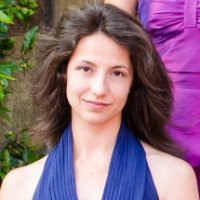Maria Gorinova

Talk: A Live, Multiple-Representation Probabilistic Programming Environment for Novices
- Date and Time
- May 13, 2016 at 3:30pm
- Location
Abstract
Probabilistic programming languages, such as Infer.NET, attempt to unify general purpose programming with probabilistic modelling, in order to introduce a more abstract and powerful way of applying probabilistic models to real-world problems. This approach is becoming especially popular for data analytics, as many statistical techniques are more naturally expressed using such languages.
However, the basic concepts of probabilistic programming differ from those of conventional programming, which means that learning such language could be a challenge even for an experienced programmer. In this talk, I will present a live, multiple-representation environment for probabilistic programming based on the Infer.NET framework, addressing these conceptual differences and makes the capabilities of probabilistic programming more accessible to students and end-user developers.
Finally, I will outline a controlled experiment on 16 participants, in which when compared to a text-only editor, the system showed a significant reduction in keystrokes during introductory probabilistic programming exercises, and subsequently, a significant improvement in program description and debugging tasks as measured by task time, keystrokes and deletions.
Bio
Maria is a PhD student in the Graphics and Interaction Group at the University of Cambridge. My current work aims to improve the ways in which data in the healthcare sector is manipulated and analysed, by bringing the power of programming by example to spreadsheets.
My broad interests range from programming languages and verification, to machine learning and human-computer interaction. More specifically, I’m interested in program synthesis, probabilistic programming languages, and how machine learning methods could be applied to verification or software engineering problems.
Previously, I received my BA from University of Cambridge (June 2015), where for my final year project I developed an IDE for Probabilistic Programming.
